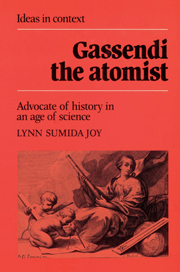Book contents
- Frontmatter
- Contents
- Preface
- List of illustrations
- INTRODUCTION
- PART 1 HUMANIST HISTORIOGRAPHY
- 2 Refuting Aristotle is not enough: how to acquire the skills of a French humanist
- 3 Gassendi's Life of Peiresc: the humanist's unattainable goal of writing a universal history
- 4 The growth of Gassendi's Epicurean project: from biography and commentary to a history of philosophy
- PART 2 PHYSICS AND THE HISTORY OF PHILOSOPHY
- List of abbreviations used in the notes
- Notes
- Index of names
3 - Gassendi's Life of Peiresc: the humanist's unattainable goal of writing a universal history
Published online by Cambridge University Press: 01 September 2009
- Frontmatter
- Contents
- Preface
- List of illustrations
- INTRODUCTION
- PART 1 HUMANIST HISTORIOGRAPHY
- 2 Refuting Aristotle is not enough: how to acquire the skills of a French humanist
- 3 Gassendi's Life of Peiresc: the humanist's unattainable goal of writing a universal history
- 4 The growth of Gassendi's Epicurean project: from biography and commentary to a history of philosophy
- PART 2 PHYSICS AND THE HISTORY OF PHILOSOPHY
- List of abbreviations used in the notes
- Notes
- Index of names
Summary
Gassendi's residence in Paris and his Dutch travels in the late 1620s were significant not only because they resulted in his decision to expand the scope of the Epicurean project. They also constituted a key period in his development as a historian of philosophy. For just as his earlier encounters with Mersenne had forced him to rethink the consequences of his use of skepticism as a weapon against Aristotle, his new encounters with influential humanists forced him to recognize the importance of other aspects of humanism, especially those aspects involving the creation and use of scholarly libraries. In Paris Gassendi himself succumbed to the attraction of days of endless research in an impressive repository of books and documents, the library of the historian Jacques-Auguste de Thou, which was administered since De Thou's death in 1617 by Pierre and Jacques Dupuy. Mindful of the open-endedness of research in a library containing over 8,000 volumes of printed books and over 1,000 manuscripts – research in which the determinate goal of refuting Aristotle may easily have been subsumed in the investigation of other philosophical systems – Gassendi began to recognize a tacit assumption underlying the humanists' devotion to scholarship. He recognized the tendency of his scholarly friends to assume, on the basis of their research in such libraries, that the whole spectrum of past human cultures could be assembled and analyzed if only scholars would work assiduously enough toward that end.
- Type
- Chapter
- Information
- Gassendi the AtomistAdvocate of History in an Age of Science, pp. 41 - 65Publisher: Cambridge University PressPrint publication year: 1988



